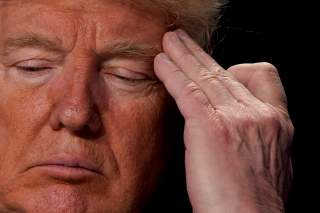Donald Trump Will Never Achieve 'Total Victory' in a Trade War with China
America is not going to win an unqualified, unambiguous “total victory” in the trade war with China. Chinese consumers and businesses are not hurting any worse than American ones, so we shouldn’t hold out for Chinese capitulation to American demands. Rather, we should make limited demands and look for a quick resolution.
In a manufacturing plant in Dongying, Shandong province, workers are pumping out thousands of brake rotors every day. After spending two weeks touring this factory and a dozen others like it, it’s clear that Chinese employees on the factory floor—not to mention Chinese corporate accountants—expect to find customers for their products. They know consumers need what they’re producing, whether they’re in China, Europe, Southeast Asia, or, yes, America, whether America imposes tariffs or not.
This brings us to a hard fact: America is not going to win an unqualified, unambiguous “total victory” in the trade war with China. Chinese consumers and businesses are not hurting any worse than American ones, so we shouldn’t hold out for Chinese capitulation to American demands. Rather, we should make limited demands and look for a quick resolution.
There are a number of reasons why tariffs are not having their intended effect on Chinese companies and consumers—and why there has not been a corresponding benefit for American companies.
First and foremost, tariffs only serve to “onshore” manufacturing if there is a domestic manufacturing base ready to meet the sudden new demand for tariff-free goods. To be blunt, America does not have that capacity, and few places other than China do. Take the automotive aftermarket, my industry. In China, the parts and repair aftermarket is projected to reach $188 billion this year alone, and is expected to overtake the U.S. in 2030 in terms of overall market demand. China has built the capacity to serve both the domestic and global market in a way U.S. producers simply haven’t. For certain parts, like power steering components, there are no quality producers outside of China. When there are no non-Chinese suppliers, a tariff becomes little more than a glorified sales tax on American consumers. Chinese companies feel no effect.
Second, tariffs aren’t all that hard to circumvent. Many Chinese manufacturing companies are moving to other countries (besides the U.S.) to create their products in tariff-free or reduced tariff countries. Buying component parts or raw material in China and manufacturing them in Mexico is a less efficient way of doing business, sure—but it’s not any harder on Chinese suppliers. Whether companies should be doing this is a separate question. But whether global companies are circumventing tariffs is no question at all. American consumers aren’t the winners here—international trade attorneys are.
Third, Chinese consumers are, unfortunately, used to paying duties on goods. For decades, they’ve had to pay higher prices to support domestic manufacturers and state-run companies. This is, of course, a violation of WTO rules. Yet that doesn’t change the fact that Chinese consumers are more able to weather the increased prices necessitated by a trade war—simply put, years of practice have helped them develop a higher threshold for pain.
Finally, the U.S. is not the only market for Chinese goods, nor its only supplier. As trade tensions ratcheted up with the U.S., China unilaterally lowered tariffs with other nations, fostering alternative markets for their goods and alternative suppliers for their consumers. Chinese companies are also focusing more on their domestic markets. The U.S. is not China’s only market for trade and commerce.
This isn’t to say the trade war will end in an unambiguous loss, either. China’s economic growth is slowing, so the trade war has built some limited leverage. Ultimately, the Chinese government wants the trade war to end.
America should not think, however, that its leverage is by any means enormous, nor should it think it is likely to develop more anytime soon. The trade war has harmed American companies, brands, and consumers, and the Chinese government knows it.
American trade negotiators need to look for an off-ramp, and they need to accept well less than “total victory.” They should not expect anything that approximates a balancing of the U.S. trade deficit, nor an end of subsidies to Chinese companies. They should settle for stricter intellectual property enforcement along with a few minor concessions and call it a day.
They should let us all get back to work. And they should let those brake rotors rolling off the line in Dongying, Shandong province take their rightful place in an American consumer’s vehicle, helping that American get to work and go about his business without having to pay an import tax on an item that is not available anywhere but China.
Morris is Chief Merchandising Officer at US Auto Parts Network, Inc., the parent company of CarParts.com.

